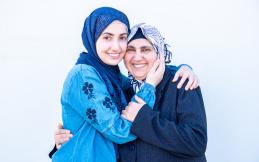
The status of women has been one of the constant sources of tension between the West and Muslim. While their position in Islam has been attacked, maligned and been the subject of misinformation by Western colonialists of the past, and the media of the present, Muslims are also struggling between the model of the West, the culture loaded historic reality of their respective country, and the Islamic ideals.
This is why it is crucial that Muslim women acquire prominence in the agenda of Islamic activism.
Here are 14 things you can do for Muslim women in Muslim countries. They may be small but they could create a ripple, then a wave, Insha Allah (if Allah wills).
1. Dua
Allah is the Creator of all. We ask Him for strength and seek protection in Him from the evil.
2. Teach yourself
Know what Islam says about women, both their rights and responsibilities. One good book on this topic is Gender Equity in Islam by Jamal Badawi.
3. Make sure your personal behavior is in line with what Islam says.
What's the point of reading what Islam says if you're not going to practice it? Practice what you read in reference to your mother, wife, daughter, and fellow Muslim sisters in your community. Respect all human beings. Remember that many Muslims have inherited or accepted the cultural practices which may be oriental or western in its origin but not Islamic. If you act Islamically in your dealings with women, you could positively affect change in your family at least.
4. Do they practice Islam or "Men's Islam"
Islam requires men and women to learn Islam themselves and practice it. Both are required to have a direct relationship with Allah. Whereas "men's Islam" is a cultural practice of some Muslims. In this cultural Islam, women don't pray; they don't know Quran; they don't have knowledge of what the Prophet wanted, they are likely not a part of any Islamic activity while the males of the family are praying, learning and possibly working for Islam. If you consider Islam is being practiced only by men, then do the following:
- Establish salat (prayers) in that home when you visit
- If possible establish a prayer room in the home
- Use that room for the collective study of the Quran as well
- Establish shura in that room to see what educational and Islamic activity women of that family can start
- Ask Imam and masjid committee to make room for women if it does not exist at this moment
- Invite Muslim women scholars, teachers, and other achievers to your home and Muslim events so girls have positive female role models
- Refuse to participate in organizations who do not allow participation of women
5. Speak out against injustice
UnIslamic customs are usually not written in the books. Rather they are cultural practices that have been handed down over centuries and will take a lot of time to change. This is why it's important to remember proper Adab (etiquette) of enjoining the good and forbidding the evil. Use gentle, wise language and a well-thought out approach in speaking out against what is wrong, so that you do not disrespect elders or hurt the feelings of those younger than you but do speak out against what is wrong in a number of practices related to women.
Make a statement by not participating in unIslamic activities
6. He who does not thank people does not thank Allah
We often don't understand the importance of recognizing the work at home. Being thankful and appreciative of the work women perform in household is not a tradition in most countries. The psychological effects praise and others' thankfulness have on us is tremendous. If you ask a number of women, they'll tell you they enjoy working outside the home for instance, because there is a system of rewards and appreciation, while staying at home and taking care of the family is given no outward appreciation by husbands, parents and children, for instance.
Praising girls and women in Muslim countries (and at home) for their work, whether it's your aunt who took care of you during your visit to the old country or your little cousin who washed your clothes while you were there, is a form of encouragement and a sort of boost to the person. It's a small gesture, but it goes a long way. And remember that the Prophet Muhammad (peace and blessings be upon him) said that, ‘He who does not thank people does not thank Allah' (Ahmad, Tirmidhi).
7. Appreciate the Islamicity of girls
If you have a young niece or cousin, for instance who prays, reads Quran and tries to practice Islam, praise and encourage them. They are on the right track Alhamdu lillah (Praise be to Allah) while so many other young people in Muslim societies are heading off track. Too often, the Islamicity of women is given scant attention in Muslim cultures, while emphasized more strongly for boys. Your praise will not only serve as encouragement, it could also be incentive for others to become similarly Islamic-oriented.
8. Keep in touch with relative back home
Don't just wait to visit a Muslim country to help improve conditions for Muslim women there. You can support an agenda of change right from here. Keep in touch by letters and e-mail with cousins, aunts and uncles and friends. You can talk to them on the following:
Do all women among your relatives know how to read and write?
- Who can teach those who cannot
- What incentive can you offer
Are all women in your neighborhood literate?
- Who among women can teach them
- Can your living room be used as a day time class room
- What incentive can you offer
- Can women in your extended family establish an organization to support literacy in your neighborhood?
What is the level of Islamic knowledge in your family?
- Do women read Quran and the Seerah of the Prophet
- Do they attend Friday khutba
- Does your masjid have proper facilities for women
If they have a maid in their home:
- How is she treated
- Is she paid at the level which allows her to maintain her household
- Is she given enough breaks to attend her family
- Can she read
- Do her children go to a school
- What can you do to facilitate her children's schooling
- Is she treated as equal or she is treated as an untouchable
Participate. Be helpful. Don't allow yourself to be framed as "telling us what to do while sitting comfortably in the West." Once again wisdom and beautiful preaching need to be part of the approach.
9. Build an Islamic Women's Library as a gift
Get good literature in the language a relative or friend understands. But read it first. If you have cousins who read and understand English give them material developed in North America and the U.K., where Islamic materials in English are of better quality, generally, than those developed in Muslim countries. This will be an educational tool you can give as a gift.
Can you get the following two books translated in your lanugage:
- Jamal Badawi's Gender Equity in Islam
- Hasan Turabi's Women in Islam and Muslim Society
10. Find a "woman friendly" Imam
This is someone who is on solid Islamic ground, who knows Islam, has the Hikmah (wisdom) to know how to speak properly about women's issues. Introduce your relatives and friends back home to him and encourage them to frequent his mosque.
- See if he can start some classes
- Can you give him gifts of some books regarding women and Islam?
11. Encourage this Imam to speak about women's issues
Encourage this Imam to talk about topics relating to women's issues. For instance, the importance of treating families, and wives in particular, with kindness; a husband's role and responsibilities; speaking out against abuse; etc.
12. Stop favoring boys over girls
Although unlike China and India, in Muslim countries, female fetus is not aborted, the birth of boys does get welcomed more enthusiastically. Confront this un Islamic situation. Always value girls and boys equally. Talk about how the Prophet Muhammad had daughters whom he loved and cared about deeply in a time when people would bury their daughters alive.
13. Read about male and female companions
At nighttime, when parents and kids often enjoy a story before bed, read your relatives and friends stories of the female Companions of the Prophet and the important role they played in the establishment of Islam. This could reinforce the understanding that Islam is not a religion for men only, but for all humans, and women, just as much, and in a number of cases even more, than men have lived it, fought for it and even died for it.
14. Defend them
Defend them in their countries against those who violate their rights.
Defend them against violence and abuse.
And now defend them against the UN. Most Muslims have no idea what the UN is planning to do to their Islamic way of life. It is your duty to uphold the rights of Muslim women to Islam.
Photo Attribution: Adam Jones - http://commons.wikimedia.org/wiki/File:Cham_Woman_-_Chau_Doc_-_Vietnam_-_01.JPG








Add new comment